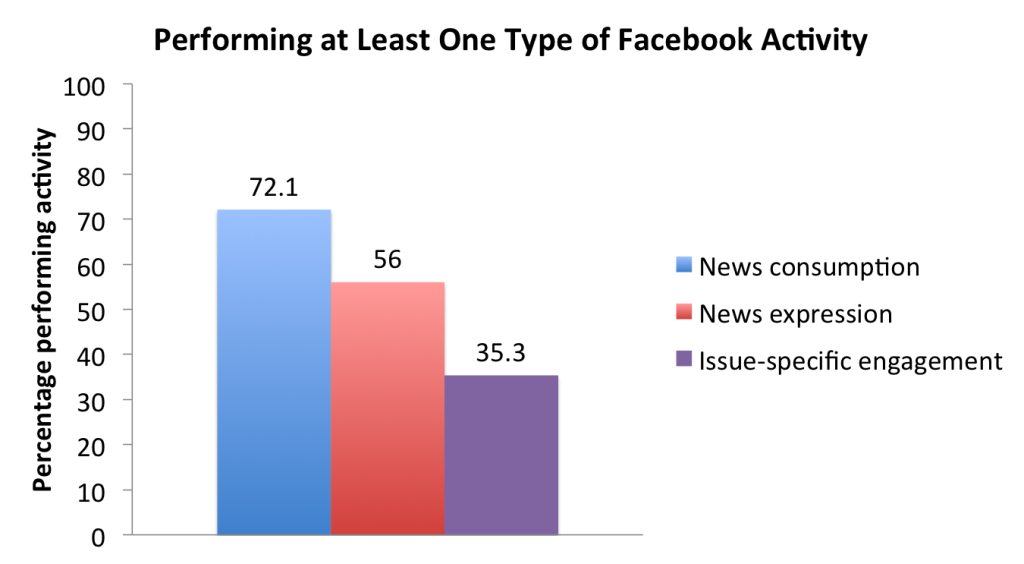Even as scholars discuss changes in the ways in which young adults approach politics – and particularly their focus on specific issues and social concerns rather than dutiful political participation – a lot of what we know about political engagement via social media focuses on politics proper: political candidates and campaigns. While this research is largely promising about the potential for political engagement online to transfer into broader forms of participation (e.g., Bode et al., 2014, Vitak et al., 2011), there are also limitations: people tend not to like politics on Facebook and political expression is relatively rare.
But social issues, for all that they often have clear political impact, may be different. Pew has fond that more people engage with issue groups online than political officials, and there are several examples of social media campaigns – the Red Equal Sign campaign and the ALS Ice Bucket challenge most notably – where issue-based activism has occurred. Working with colleagues Ashley Anderson, John Kotcher, and Edward Maibach from the George Mason Center for Climate Change Communication, we examined how issue-specific activism on the issue of climate change and energy policy may differ in terms of who (among Republicans) is performing such activism and what the implications are for issue-specific opinion leadership (i.e., believing you have expertise and influence over others on the issue) and efficacy (i.e., believing that your opinion can make a difference politically), as compared with more generalized forms of political expression and information consumption via Facebook.
Using a national survey of Republicans (including Independents who lean Republican) in Spring of 2013, we investigate these relationships. We focus on Republicans because they tend to be more split on the issue of climate change and energy policy, as well as less participatory on social media for political purposes. Looking at the 445 Republicans who report using Facebook, we find that fewer are directly engaging with the issue of energy policy on Facebook than compared to those reading or expressing themselves about news overall. We suspect that although engagement in issues overall may be higher than politics, engagement in any one issue is likely to be low, often limited to an issue public of people deeply engaged in that topic.

However, we do find that different personal characteristics impact who is engaging in issue-specific activity on Facebook: notably, more liberal (among Republicans!) men, often lower-income, and who rely on conservatives and friends as sources of information, rather than more “official” channels like the mainstream news or government. Additionally, we find that general news consumption, expression, and issue-specific engagement are all highly related, suggesting there may in fact be a Facebook activist overall who is interested across a variety of current affairs and social issues.
But despite the high correlation among these types of Facebook activity, only issue-specific engagement consistently predicts higher levels of opinion leadership and political efficacy on the issue of climate change and energy. And this makes sense: if social media use promotes offline engagement through connections to like-minded individuals, exposure to information you generally agree with, and reinforcement of your identity as someone who cares about the issue, this relationship should be strongest when it is directly relevant to the issue(s) being considered in a way that general news interest cannot replicate. However, we are also unable to speak to whether it is the online Facebook activities that promote these behaviors or whether they lead to these types of activities, although we suspect it is likely a reciprocal and mutually reinforcing relationship. Further, it is worth testing whether these relationships occur for other groups (notably, Democrats) and other issues – especially those with less overtly political overtones.
For practitioners, our results suggest that encouraging Facebook engagement with a particular issue or organization has long-term benefits, not just in exposure to information or promotion among friends, but in creating individuals who see themselves as influential on the issue. Yet we also offer a word of caution: issue-specific activity on climate change and energy worked equally among those Republicans who believed climate change was real and severe, and among those who did not. Therefore, Facebook action designed to promote one side of the issue is may be equally likely to mobilize its opponents as well.
Ultimately, however, we hope that our study encourages researchers to more carefully consider and define what they mean by activism via social media networks. Specific forms of information consumption and expression may be more or less effective in creating opportunities for influencing individuals’ attitudes and behaviors depending on the nature and the target of their online efforts.
Please click here for a PDF of the Accepted Manuscript for this study, which is available online from the Journal of Information Technology and Politics.